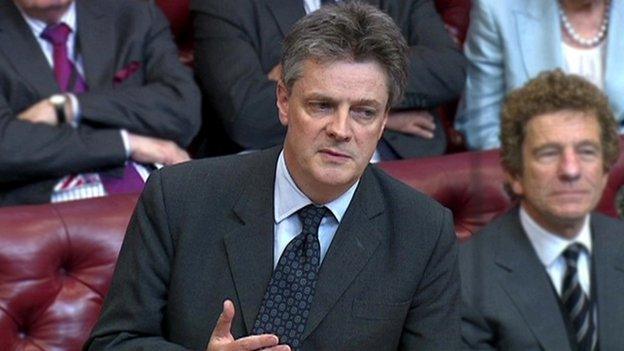EU hearings: The grilling of Lord Hill
- Published
- comments

Some MEPs want to probe Lord Hill's ties to the UK financial establishment
In the middle of the day on Wednesday a former leader of the House of Lords will face a three-hour grilling in the European Parliament.
It is fair to say that Lord Hill will never have endured such a detailed public questioning before.
Jonathan Hill is the UK's nominee for the job of EU Commissioner. The next President of the European Commission, Jean-Claude Juncker, has given him the portfolio overseeing financial markets and regulation.
In Brussels, Lord Hill's confirmation hearing is already being billed as political theatre, with the promise that he will get a rough ride with hostile questioning.
Parliamentary muscle
Firstly, as often, this hearing has much to do with power. The European Parliament is determined to underline its growing influence. It won a key battle when the candidate of the party which gained the most votes in the May European election ended up as Commission president.
The MEPs are keen to make the commissioners sweat under the lights, not least to demonstrate that the parliament must increasingly be taken seriously.
Secondly, of course, there is a political calculation. It is a widely held view among MEPs that the banks were to blame for the financial crisis of 2008. The design flaws of the euro and the failures of governments to embrace reforms rate as insignificant compared to the irresponsibility of the banks.
Which brings us to Lord Hill. Some MEPs believe that putting a British politician in charge of financial regulation is like handing the key to the hen house to a fox. Some openly question whether he can be a neutral referee.
During the past five years there have been 40 new financial regulations. The MEPs will want to be reassured that Lord Hill will enforce the rules. The outgoing commissioner, Michel Barnier, said that "enhanced supervision and regulation is the new normal".
Some MEPs also dislike the fact that Hill was a former lobbyist, and he will face some searching questions.
Commitment to EU?
Jonathan Hill will also need to underline to the economics committee that he will act in the "European" interest rather than the "UK" interest. He has already said that as commissioner he will be "guardian of the treaties" and will not hesitate to enforce legislation. He will make the argument that "the UK is stronger as part of a stronger EU".
Any major stumble and some MEPs might move to reject him, although that is unlikely. They cannot remove a single candidate; they would have to reject the college of commissioners as a whole.
The UK was delighted when Juncker offered Hill the financial services job. It was a political calculation aimed at signalling to the UK that after David Cameron had opposed Juncker's appointment there were no hard feelings. It was also an indication of how seriously Brussels takes the threat of the UK leaving the EU after 2017.
Lord Hill will not have sole responsibility for the much-disputed argument over banker's bonuses. That will be shared with the new justice commissioner, but Hill will be at the heart of launching a new EU capital markets union. That is of huge importance to the UK. Nearly 40% of the EU's wholesale financial markets is based in the City of London.
Michel Barnier said this week that the EU was not trying to weaken the City of London or "undermining the UK". That may be true, but the grilling of Lord Hill will not only tell us much about how he will survive in Brussels but will reveal something of the mood towards Britain, as it prepares to renegotiate its EU membership.
- Published29 September 2014

- Published18 September 2014
